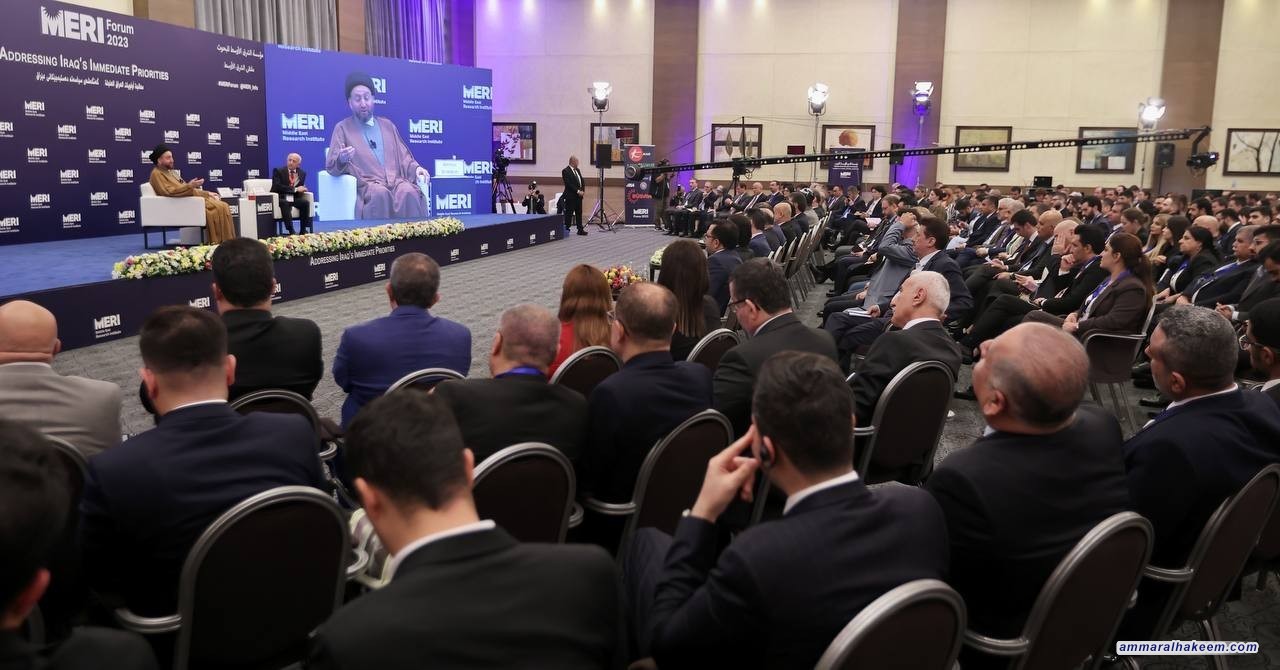Sayyid Al-Hakeem: Calls to invest current stage to enact crucial laws
During the Middle East Dialogue Forum (MERI) in Erbil, Sayyid Ammar Al-Hakeem, Head of Al-Hikma National Movement, acknowledged the collective sacrifices made by Iraqis in establishing the country's democratic experience. His Eminence stressed the importance of increased cooperation and collaboration among Iraq's citizens to achieve the nation's interests and the well-being of its people. H.E. also expressed his delight at visiting the Lalish Temple and participating in the collective Yazidi festival, shedding light on the hardships faced by this community. H.E. called for a commitment to justice, a move away from revenge, and the adoption of a conciliatory approach.
H.E. further highlighted the significant role played by Al-Hakeem Foundation in hosting meetings with Yazidi survivors and United Nations representatives. H.E. pointed out that Shiite Turkmen women have faced similar challenges and emphasized that the Sinjar Agreement resulted from extensive dialogues involving various parties, including the federal government, regional government, local authorities, and the UN mission. H.E. noted that the agreement's implementation fell short of expectations as each party interpreted it to serve their interests, leaving the Yazidi community without a fair share. H.E. expressed hope that the upcoming provincial council elections would result in a balanced equation and lead to the election of representatives from Sinjar and a competent district administrator.
H.E. clarified that the Coordinating Framework is an extension of the National Alliance and the United Iraqi Coalition, serving as labels representing the broader social component. However, H.E. emphasized that this doesn't imply exclusive responsibility; instead, it should be a shared endeavor where each party contributes according to its capacity and role. H.E. recognized that the conditions in Iraq were far from ideal, considering the challenges of transitioning from an authoritarian regime to a democratic system, combating terrorism, addressing societal conflicts, and navigating the absence of a clear formula, despite regional and international perspectives. H.E. urged a fair approach when evaluating these challenges.
H.E. also underscored that Iraq has successfully navigated through complex stages, achieving relative stability in security, politics, and society. H.E. stressed that the State Administration Coalition, being the first coalition to transcend traditional components, participates in decision-making through regular meetings. H.E. emphasized the critical need for political will to pass essential laws, such as the Federal Council law, Federal Court law, and Oil and Gas law. H.E. expressed hope that the State Administration Coalition would have the capacity to approve these laws and implement the political agreement paper. H.E. mentioned that during meetings with Kurdistan Region leaders, there is a genuine willingness to pass these laws.
H.E. explained that the State Administration Coalition emerged based on the Political Agreement Paper, which he described as the roadmap for addressing crucial issues. H.E. noted the Prime Minister's sincere commitment to implementing the agreement, with the State Administration Coalition regularly monitoring its progress, achieving a 55% implementation rate. H.E. called for in-depth dialogues to facilitate the passage of laws and overcome obstacles arising from each party's differing perspectives or personal interests. H.E. encouraged seizing the opportunity due to the presence of the State Administration Coalition, the political stability, and the effective leadership of the Prime Minister


/9/3/photo_2025-12-10_09-25-13.jpg)
/9/2/photo_2025-12-10_09-17-58.jpg)
/9/1/photo_2025-12-10_09-11-13.jpg)
/8/3/photo_2025-12-09_10-42-49.jpg)
/8/2/photo_2025-12-09_10-37-31.jpg)
/8/1/photo_2025-12-09_09-54-18.jpg)
/7/1/photo_2025-12-08_09-38-41.jpg)
/5/1/photo_2025-12-07_09-25-35.jpg)
/3/2/photo_2025-12-04_11-05-55.jpg)
/3/1/photo_2025-12-03_11-49-28.jpg)